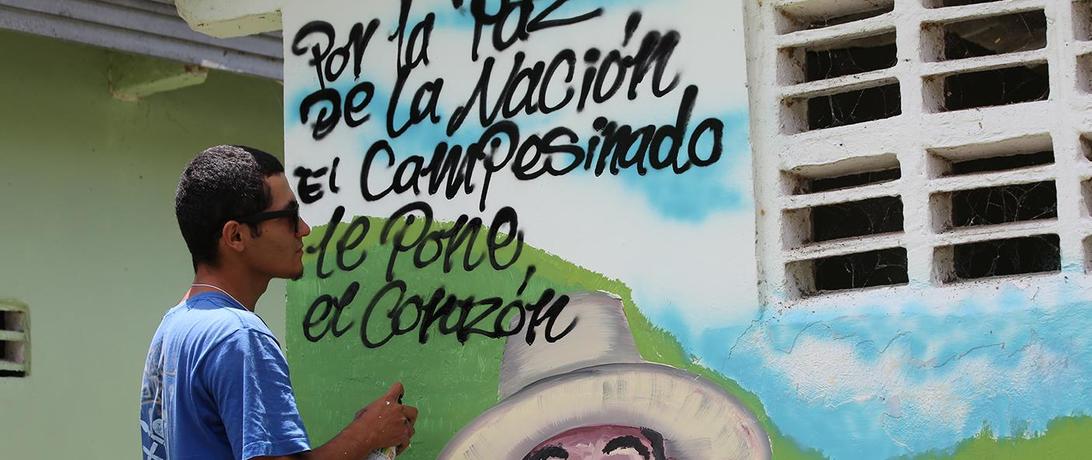
Colombian President Juan Manuel Santos was awarded the Nobel Peace Prize on October 7, less than one week after Colombians rejected the peace deal negotiated between the government and FARC rebels, underscoring the complexities involved in winning peace.
See more on PASO Colombia's role in the peace process, in this Boulder Weekly feature.
Colombian President Juan Manuel Santos was awarded the Nobel Peace Prize on October 7, less than one week after Colombians rejected the peace deal negotiated between the government and FARC rebels, underscoring the complexities involved in winning peace.
On October 2, Colombians went to the polls to ratify a peace treaty that had been signed between the national government and the Revolutionary Armed Forces of Colombia (FARC), ending more than 50 years of civil war. Despite a widespread desire for peace, public opinion on what peace means and what peace should look like for all Colombians polarized the country resulting in a “no” vote by the slimmest of margins. One Earth Future understands and respects the decision of the Colombian people and reinforces its commitment to building sustainable peace from the ground up in Colombia.
This is a transformational moment in Colombia’s history. One Earth Future’s program, PASO Colombia (Sustainable Peace for Colombia), remains devoted to ending conflict and believes stakeholders in the peacebuilding process—social, religious, political, economic, non-governmental and civil society entities—must actively advocate for the long-term structural change and investment required for an inclusive and sustained peace.
PASO Colombia continues the hard work required to build and maintain peace. The recent “no” vote reinforces the importance of the work it is doing in the territories to fulfill its purpose: to build systemic and sustainable peace by repairing the social fabric in communities like Valle del Cauca and Antioquia that have faced violence for more than half a century. The PASO team is steadfast in its work with Colombian communities to encourage and instill peace through the use of innovative technologies that are socially inclusive.
From the beginning, PASO Colombia has insisted that peace does not live on a piece of paper but must be built at all levels of society over the long run. This approach to peace has never been more relevant than it is in the context of Sunday’s “no” vote.
Today, PASO Colombia works in outlying neighborhoods of Cali and Medellín, in rural communities in Buga, and in the gold mining area of Antioquia. The team works with social organizations focused on women, peasants and youth, as well as public institutions, faith-based organizations, community members and other peacebuilders to strengthen economic and social structures in communities most impacted by a half-century of war.
One initiative, Let’s Dialogue Peace from our Territories (Peace is Ours!), encourages public reflection, engagement, and advocacy for peace throughout Cali. We believe peace should be built by everyone and for everyone from a grassroots perspective. There is a gap when it comes to the national peace as perceived by those living in Colombia’s largest cities and urban areas and those who live in the territories where much of the guerilla fighting has taken place. This makes it imperative to work with diverse groups and institutions at a grassroots level so local communities across Cali can commit to building peace with their own hands. The first such gathering, located on the marginalized east of the city, welcomed nearly 500 persons from 54 neighborhoods, demonstrating that diverse communities are prepared to build their own peace.
In addition to acting as a catalyst for bringing diverse communities together to reinforce peace, PASO Colombia is investing time, money and effort in restoring and further developing peasant economies in communities which have endured historic stigmatization and marginalization in areas of guerrilla presence, lack of technical assistance, weak infrastructure and decades of violence. In the town of Vereda el Placer, northeast of Cali and near Buga, the team is assisting villages in building a 10,000-liter (2,600-gallon) milk storage facility that can keep milk chilled so hundreds of dairy farmers from as many as 14 neighboring towns can get a better price for their milk.
The PASO team is also collaborating with another One Earth Future program, Secure Fisheries, to bolster the artisanal fishing industry in Buenaventura, the most important port in Colombia, located in Valle del Cauca, the municipality with one of the highest rates of crime and poverty. They are partnering with fishers, merchants, community organizations and public workers to encourage economic, social and community development through secure and sustainable fishing practices. Shoring up fisheries governance and security will allow the community to prepare for post-conflict reconstruction by providing jobs and economic growth.
These initiatives are a few of the many ways PASO Colombia and One Earth Future continue to work with local communities to help them build peace with their own hands. Colombians have expressed their commitment to continue working together to transform their country and the PASO Colombia team will continue empowering people to establish successful systems that eliminate root causes of war. To the extent that the “no” vote results in a more inclusive dialogue about the nature of peace in Colombia and a better understanding of what peace means for communities, Sunday’s plebiscite may prove to be an opportunity for the long-term sustainability of peace in Colombia.
Article Details
Published
Topic
Program
Content Type
Opinion & Insights